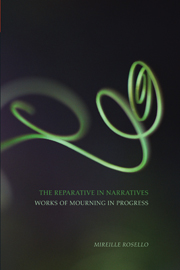Book contents
- Frontmatter
- Contents
- Acknowledgements
- Introduction: From the Debate on ‘Repentance’ to the Reparative in Memorial Narratives
- 1 Algerian Humour: ‘Jay Translating’ Words and Silences
- 2 René-Nicolas Ehni: Matricide and Deicide as Figures of Unforgivable Violence and Redemption during the Algerian War of Independence
- 3 The Truth of False Testimonies: False Brothers in Michael Haneke's Caché
- 4 Gisèle Halimi's Autobiographical and Legal Narratives: Doing to Trees what They Did to Me
- Conclusion: Repentance and Detective Fiction: Legal Powerlessness and the Power of Narratives
- Notes
- Bibliography
- Index
Conclusion: Repentance and Detective Fiction: Legal Powerlessness and the Power of Narratives
- Frontmatter
- Contents
- Acknowledgements
- Introduction: From the Debate on ‘Repentance’ to the Reparative in Memorial Narratives
- 1 Algerian Humour: ‘Jay Translating’ Words and Silences
- 2 René-Nicolas Ehni: Matricide and Deicide as Figures of Unforgivable Violence and Redemption during the Algerian War of Independence
- 3 The Truth of False Testimonies: False Brothers in Michael Haneke's Caché
- 4 Gisèle Halimi's Autobiographical and Legal Narratives: Doing to Trees what They Did to Me
- Conclusion: Repentance and Detective Fiction: Legal Powerlessness and the Power of Narratives
- Notes
- Bibliography
- Index
Summary
In January 2008, after the evening national news, France 2 network showed an episode of the popular P.J. Saint Martin detective series called ‘Erreurs de jeunesse’ [Mistakes of Youth]. I remember following the plot with a growing sense of astonishment as it slowly became apparent that the puzzle the investigators were slowly putting back together was telling a story about France's colonial past or more importantly about its impact on the immediate present. The episode made three assumptions that I thought were remarkably revealing about the recent thematic and generic norms that govern memorial narratives (even if they remain invisible). First, the story expected the audience to be familiar with the history of the war between France and Algeria. Secondly, P.J. Saint Martin gambled that a story about the rape of an Algerian woman by a French soldier would not systematically alienate prime-time viewers. Finally, it was also assumed that we would be interested in discovering how the past affected the lives of two characters who had previously been on each side of the national and ethnic line and were now living in the same French neighbourhood.
Contemporary Frenchness is here defined as the complicated weave of memorial threads that cannot or can no longer be reduced to a mosaic of narratives that each emanate, supposedly monolithically, from a given community (the [sons and daughters of] the former moudhahid, harki or French soldier, the colonizing or colonized civilian, the former ‘pied-noir’ or ‘pathos’).
- Type
- Chapter
- Information
- The Reparative in NarrativesWorks of Mourning in Progress, pp. 187 - 204Publisher: Liverpool University PressPrint publication year: 2010



